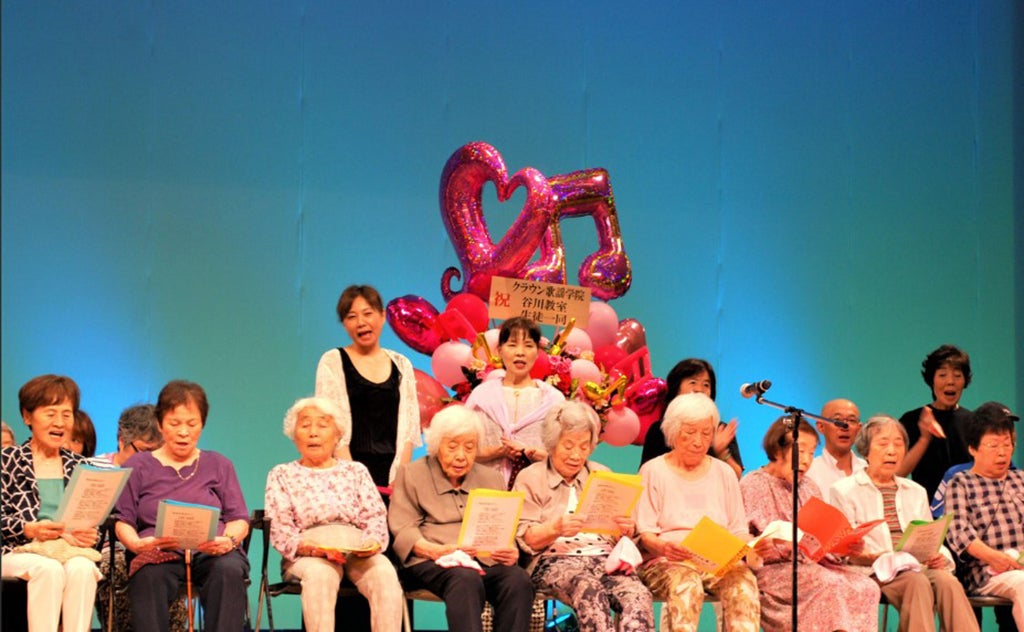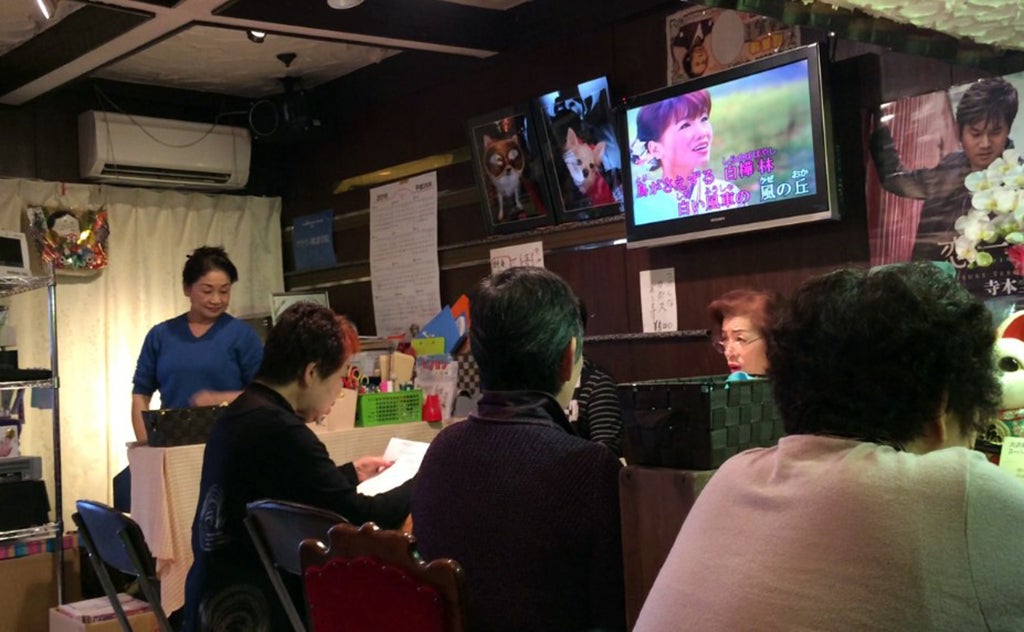Senior Leisure in the New Normal
Benny Tong, 16 Oct 2020

Residents and staff of a senior home sing on stage at Chou’s annual recital in 2016. Photo © Mr. Hisao Ikenouchi
For many senior Asians, leisure activities outside the home are crucial to their daily social lives. However, the ongoing enforcement of safe distancing measures to curb the spread of Covid-19 has caused dramatic shifts and disruption in the leisure habits and lifestyles of seniors across Asia. Particularly, the fear of increased social isolation among older Asians has been raised in the mass media. As such, in policy work on ageing issues, a key concern now is the conceptualisation of new ways of leisure participation that keep seniors safe from the risk of infection, while allowing them to maintain their social connections.
In this essay, I look at how three groups of senior leisure enthusiasts in Singapore and Japan have coped since the Covid-19 outbreak in January 2020. Through their activities and concerns, I highlight crucial points for intervention in re-evaluating seniors’ engagements in leisure pursuits in the post-outbreak new normal.
Is old age a time of loneliness?
Many societies in Asia, such as Singapore and Japan, are experiencing a rapid ageing of their population due to increasing lifespans and ultra-low fertility rates. Furthermore, many seniors are living away from their children, either alone or only with their spouse. The proportions of seniors aged 65 or above in Singapore and Japan who are living in elderly-only households currently stand at 33.7 per cent and 57.8 per cent respectively
Shifts in the demographic balance, and physical and emotional distancing between seniors and their offspring, throw into question ideas of fulfilment in old age based on Confucian family ideals, such as zi sun man tang (a household filled with children and grandchildren), which are increasingly unrealistic for many senior Asians. For example, in Japan, the idea of kodokushi (lonely death, or dying alone) has gained widespread recognition due to prominent media coverage in recent years of seniors who have been found dead alone in their residences. Such demographic and sociocultural developments have thus stoked fears of social isolation and loneliness among seniors in many Asian societies.
Engaging elderly life proactively through leisure
However, many senior Asians have risen to the task of proactively engaging with the outside world to construct their own sources of meaning, fulfilment, and well-being in old age. Leisure activities are a particularly popular way of doing so: in Singapore, Japan and other Asian societies, large populations of seniors regularly participate in karaoke, mahjong, gardening, gateball, and so on. Even less ‘active’ engagements, such as gathering with others for gossip, can take on greater meaning and importance for participants.

Photo courtesy of the author
This essay looks at three groups of seniors above the age of 60, who have engaged in leisure activities regularly as an important part of their current lifestyles:
- A group of senior Japanese women enrolled at a karaoke classroom, Chou, in Osaka. Most of the women had been enrolled at Chou for a few years at the time of my fieldwork research from 2016 to 2018. The women attended weekly karaoke lessons held at the classroom, and performed on stage at an annual public recital. Chou was started by the teacher and founder, Sensei (64 years old at the time of research), in 2006. A former student of karaoke singing herself, Sensei was encouraged to start Chou by her mentor, who took note of her prodigious singing talent, and urged her to pass her gift on to other karaoke enthusiasts.
- A group of senior Singaporeans enrolled in a karaoke interest group at Whampoa Community Club (‘Whampoa’ from here onwards). I have conducted intermittent research on Whampoa via phone interviews with key members since February 2020. Whampoa was founded in 2008 by a community grassroots leader, Dr. Tan (60 years old at the time of research), who wanted to provide an activity and venue through which the large population of seniors living near the community club could socialise with others. Besides, karaoke-singing lessons, Dr. Tan also offers life coaching seminars and holiday retreats through the weekly sessions.
- A group of older Singaporeans gathering every Saturday night at a neighbourhood coffee shop, ‘Kopitiam’, in Bedok. I have been speaking to a few Kopitiam regulars since April 2020 via phone and text messaging interviews. The group formed in 2002, when its original members gathered to watch that year’s FIFA World Cup broadcasts at another coffee shop. Since then, the members have continued their gatherings, despite changes in locations over the years due to closures and ownership changes of the venues.
Disruptions and adaptations due to Covid-19
The introduction of lockdown (termed ‘Circuit Breaker’, or ‘CB’, in Singapore, and the ‘state of emergency’ in Japan) and safe distancing measures, however, have drastically altered the way in which these seniors participate in their leisure activities. They have most keenly felt the restrictions placed upon physical gatherings, which formed the basis of their leisure engagements prior to Covid-19.
Whampoa’s activities were the first to be halted. Even before the Singapore government’s implementation of the CB measures, the group leaders had decided to suspend in-person meetings indefinitely from February 2020, especially amidst revelations that a group of senior karaoke enthusiasts elsewhere had formed a virus cluster. With the imposition of the CB in Singapore and the state of emergency in Japan from April to June 2020, the Kopitiam group and Chou classroom also halted their physical meetups.
An important way to cope with this drastic change was to make more use of mobile technology to maintain communication with other members. For example, James, 62, and Judy, 61, a married couple, had met their friends at Kopitiam every Saturday night since the first gatherings in 2002. During CB, they noted that their group made more use of the WhatsApp chat group to keep in touch.
‘We’ve all switched to drinking at home instead. Responsibly, of course. We share pictures of our alcohol collections to each other in the chat group, in addition to exchanging the latest information about Covid-19,’ James described. The groups at Whampoa in Singapore and Chou in Japan also began to use mobile messaging apps more during the suspension of their physical meetings (WhatsApp in Singapore, and LINE in Japan).
While it allowed the members to remain in contact with each other, they lamented that mobile communication was not a perfect substitute for physical meetings. Most worryingly, Dr. Tan and his group leaders at Whampoa warned that not all seniors can access or learn how to use digital communication platforms, speaking from their experience of maintaining contact with the group members.
‘Many younger members between the ages of 60 to 70 were already well-acquainted with the functions of mobile messaging apps. However, there is still a significant number, predominantly older, less well-educated, and living away from their children, who are unable to utilise such technology to stay in touch with others outside their home,’ Dr. Tan noted.
‘We have kept in contact with these members by calling and chatting with them weekly, but maintaining their sense of connection is still incredibly challenging. We need to rethink how we conduct our activities in trying to adapt to the new normal, especially in terms of meeting the need for digital inclusion,’ he added.
Changing forms of leisure engagement
Even with the maintenance of communication between participants, not being able to physically participate in core leisure activities has left a lingering sense of dissatisfaction.
Keiko, 65, described her attempts at continuing to practice karaoke singing at home, during the suspension of in-person classes at Chou in Japan. ‘I can’t project my voice properly at home because it’ll get too loud, and I’ll disturb the other people at home. I wasn’t able to sing like we were taught to at the classroom, and I was worried that I’d totally forget how to sing!’ Other students echoed Keiko’s sentiments, and emphasised how happy they were Sensei restarted in-person classes in June 2020, after Japan’s state of emergency was lifted.
Moreover, the continued implementation of safe distancing measures after the lockdown periods in Singapore and Japan has meant that communication and physical practices have not returned to how they were pre-Covid-19.
‘We can use technology to host the group, but it is always more fun when we can enjoy each other’s presence at the table, that personal touch,’ Judy described about the gatherings at Kopitiam in Singapore. ‘Even with the re-opening of Kopitiam, the safe distancing regulations that limit us to only five per table, and prohibits us from mingling across tables, have changed the way in which we can chat with one another. It’s harder to carry our conversations across now, and to share topics with everyone.’
In fact, many seniors in my study started engaging in other leisure activities during the suspension of in-person meetings.
Amy, 65, a co-leader of the Whampoa group in Singapore, noted, ‘Our in-person activities have been halted since February, and we still don’t know when we can resume, with senior karaoke being an activity deemed at greatest risk. Many members have been keeping busy by trying out other kinds of activities that can be done at home, or while practicing safe distancing: morning exercise, cooking, and the other activities recently introduced on television.’
Nevertheless, Dr. Tan reiterated the importance of retaining the social element of leisure activities, even in the new normal. ‘Older people need companionship: It’s very rare to find [an older person] who is totally independent and detached. Organised groups and gatherings are crucial in providing opportunities to interact and bond with others, especially with many of their adult children leading busy work and family lives. The karaoke interest group is one venue that fulfils this need for socialisation among seniors, and I hope it doesn’t lose this function.’
Why should senior leisure matter in the new normal?
This essay has looked at leisure not only as ‘the experience of satisfaction and fulfilment”, but also as “the activities that bring about this experience’. In doing so, we can start to understand its possibilities for the construction of life rhythms in old age. Particularly, in developing leisure activities into forms of regular engagement, seniors not only develop skills, knowledge and experiences that allow them to age ‘successfully’, ‘actively’ and/or ‘productively’, but more fundamentally, they create meaningful identities, at the individual and social levels, that foster positive self-esteem.
Leisure engagements can work towards the construction of identities and senses of well-being, because they are highly volitional undertakings: it is rare to be forced or obliged into pursuing leisure, especially regularly. Old age is a period when leisure can assume a greater role in identity construction and pursuits of well-being, with many seniors having retired from professional work and/or family caregiving obligations, and finding themselves with more ‘empty’ or ‘available’ time.
The tactics that the seniors in the three leisure activity groups have shown reveals such processes of proactive negotiation, even amid the massive disruption brought about by COVID-19. Indeed, lockdown and safe distancing measures have encouraged them to be more aware of the conditions that enable leisure engagements, and take ownership of how they want to continue incorporating leisure into their senior lifestyles moving forward.
Policymakers and stakeholders should thus focus on emphasising proactivity, sociality and inclusion, when restarting or designing new leisure programs for older Singaporeans in the new normal.

Dr Benny Tong is a Postdoctoral Fellow in the Changing Family in Asia Cluster. His research interests include ageing lifestyles, popular media cultures in East and Southeast Asia, and the anthropology of leisure. His dissertation ‘Singing in Life’s Twilight: Serious Karaoke as Everyday Aging Practice in Urban Japan’, was an ethnographic investigation into the construction of elderly lifestyles and well-being through the “serious leisure” pursuits of amateur singing by regulars at karaoke establishments in Tokyo and Osaka.
Dr Tong’s new book chapter ‘Better Singers Together: How Older Japanese Women Build and Maintain Social Relations in Karaoke Classrooms’ was recently published in 'Leisure Communities: Rethinking Mutuality, Collective Identity and Belonging in the New Century' Routledge (2020).
Disclaimer: The views and opinions expressed in this article are those of the authors and do not necessarily reflect the position of the editorial team or the Asia Research Institute.

